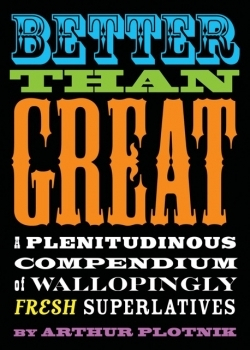Better Than Great
A Plenitudinous Compendium of Wallopingly Fresh Superlatives
It isn’t that Arthur Plotnik has a problem with praise–he thinks that’s just fine. Rather, it is the manner in which praise is expressed that rankles this writer. He is simply tired of hearing everything that is any good preceded by the word “amazing.” He laments that “the terms we use for emphasis–terms repeated over the centuries and replicated virally in this one–are now anything but exceptional.”
That’s the reason Plotnik took it upon himself to compile this volume of “some 6,000 suggested alternatives to stale superlatives.” Obviously, Better Than Great is a (insert superlative here!) resource for writers of all kinds–but it is enjoyable to read for anyone who shares his enthusiasm for expression.
The author begins with the unconventional idea that superlatives need not be seen simply as synonyms; instead, he classifies them into fifteen categories: Great; Sublime; Physically Affecting; Mentally, Emotionally, or Spiritually Affecting; Beautiful; Joy-Giving; Large; Exceptional; Intense; Delicious; Trendy; Cool; Wicked Cool; Forceful; and, Challenging Belief of Expression. Clearly, Plotnik is having a lot of fun with his own concept. Within each category, the author discusses the rationale for his classification and offers a lengthy list of superlatives, along with an occasional pertinent quote.
Better Than Great is made all the more interesting with the inclusion of “Vintage Gold,” lists of words that may be little used in modern-day language but are memorable nonetheless. Golden oldies in the “Cool” category, for example, include such classics as “bitchin’,” “far out,” “hep,” “outta sight,” and “slammin’.”
The reader who thinks Plotnik has exhausted the concept of superlatives in fifteen categories can dive into the five Appendices at the end of the book which go even further. Here, the author includes 100 selected “acclamatory terms” from advertising; a list of words that demonstrate eponymous acclaim (such as “Dickensian” or “Jordanesque”); some acclamatory alliterations; a list of “quick habit-breakers” to spur creative thinking, and, in a wise nod to the connected generation, “50 Ways to TXT Acclaim.”
Plotnik is a writer’s writer–this book is scrupulously researched, well-written, and engaging to read. As a reference tool for writers, Better Than Great is just that. But even for those with a casual interest in language, the book promises to be a great deal of fun to peruse. All readers will undoubtedly find it supremely fascinating to learn of the unspeakably large number of terms available to express greatness. (Sorry!)
Reviewed by
Barry Silverstein
Disclosure: This article is not an endorsement, but a review. The publisher of this book provided free copies of the book and paid a small fee to have their book reviewed by a professional reviewer. Foreword Reviews and Clarion Reviews make no guarantee that the publisher will receive a positive review. Foreword Magazine, Inc. is disclosing this in accordance with the Federal Trade Commission’s 16 CFR, Part 255.

